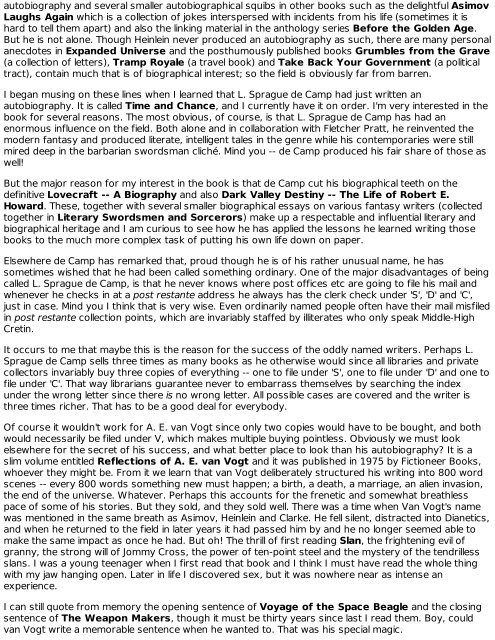Triffids Beard 2 - The Bearded Triffid
Triffids Beard 2 - The Bearded Triffid
Triffids Beard 2 - The Bearded Triffid
Create successful ePaper yourself
Turn your PDF publications into a flip-book with our unique Google optimized e-Paper software.
autobiography and several smaller autobiographical squibs in other books such as the delightful Asimov<br />
Laughs Again which is a collection of jokes interspersed with incidents from his life (sometimes it is<br />
hard to tell them apart) and also the linking material in the anthology series Before the Golden Age.<br />
But he is not alone. Though Heinlein never produced an autobiography as such, there are many personal<br />
anecdotes in Expanded Universe and the posthumously published books Grumbles from the Grave<br />
(a collection of letters), Tramp Royale (a travel book) and Take Back Your Government (a political<br />
tract), contain much that is of biographical interest; so the field is obviously far from barren.<br />
I began musing on these lines when I learned that L. Sprague de Camp had just written an<br />
autobiography. It is called Time and Chance, and I currently have it on order. I'm very interested in the<br />
book for several reasons. <strong>The</strong> most obvious, of course, is that L. Sprague de Camp has had an<br />
enormous influence on the field. Both alone and in collaboration with Fletcher Pratt, he reinvented the<br />
modern fantasy and produced literate, intelligent tales in the genre while his contemporaries were still<br />
mired deep in the barbarian swordsman cliché. Mind you -- de Camp produced his fair share of those as<br />
well!<br />
But the major reason for my interest in the book is that de Camp cut his biographical teeth on the<br />
definitive Lovecraft -- A Biography and also Dark Valley Destiny -- <strong>The</strong> Life of Robert E.<br />
Howard. <strong>The</strong>se, together with several smaller biographical essays on various fantasy writers (collected<br />
together in Literary Swordsmen and Sorcerors) make up a respectable and influential literary and<br />
biographical heritage and I am curious to see how he has applied the lessons he learned writing those<br />
books to the much more complex task of putting his own life down on paper.<br />
Elsewhere de Camp has remarked that, proud though he is of his rather unusual name, he has<br />
sometimes wished that he had been called something ordinary. One of the major disadvantages of being<br />
called L. Sprague de Camp, is that he never knows where post offices etc are going to file his mail and<br />
whenever he checks in at a post restante address he always has the clerk check under 'S', 'D' and 'C',<br />
just in case. Mind you I think that is very wise. Even ordinarily named people often have their mail misfiled<br />
in post restante collection points, which are invariably staffed by illiterates who only speak Middle-High<br />
Cretin.<br />
It occurs to me that maybe this is the reason for the success of the oddly named writers. Perhaps L.<br />
Sprague de Camp sells three times as many books as he otherwise would since all libraries and private<br />
collectors invariably buy three copies of everything -- one to file under 'S', one to file under 'D' and one to<br />
file under 'C'. That way librarians guarantee never to embarrass themselves by searching the index<br />
under the wrong letter since there is no wrong letter. All possible cases are covered and the writer is<br />
three times richer. That has to be a good deal for everybody.<br />
Of course it wouldn't work for A. E. van Vogt since only two copies would have to be bought, and both<br />
would necessarily be filed under V, which makes multiple buying pointless. Obviously we must look<br />
elsewhere for the secret of his success, and what better place to look than his autobiography? It is a<br />
slim volume entitled Reflections of A. E. van Vogt and it was published in 1975 by Fictioneer Books,<br />
whoever they might be. From it we learn that van Vogt deliberately structured his writing into 800 word<br />
scenes -- every 800 words something new must happen; a birth, a death, a marriage, an alien invasion,<br />
the end of the universe. Whatever. Perhaps this accounts for the frenetic and somewhat breathless<br />
pace of some of his stories. But they sold, and they sold well. <strong>The</strong>re was a time when Van Vogt's name<br />
was mentioned in the same breath as Asimov, Heinlein and Clarke. He fell silent, distracted into Dianetics,<br />
and when he returned to the field in later years it had passed him by and he no longer seemed able to<br />
make the same impact as once he had. But oh! <strong>The</strong> thrill of first reading Slan, the frightening evil of<br />
granny, the strong will of Jommy Cross, the power of ten-point steel and the mystery of the tendrilless<br />
slans. I was a young teenager when I first read that book and I think I must have read the whole thing<br />
with my jaw hanging open. Later in life I discovered sex, but it was nowhere near as intense an<br />
experience.<br />
I can still quote from memory the opening sentence of Voyage of the Space Beagle and the closing<br />
sentence of <strong>The</strong> Weapon Makers, though it must be thirty years since last I read them. Boy, could<br />
van Vogt write a memorable sentence when he wanted to. That was his special magic.


